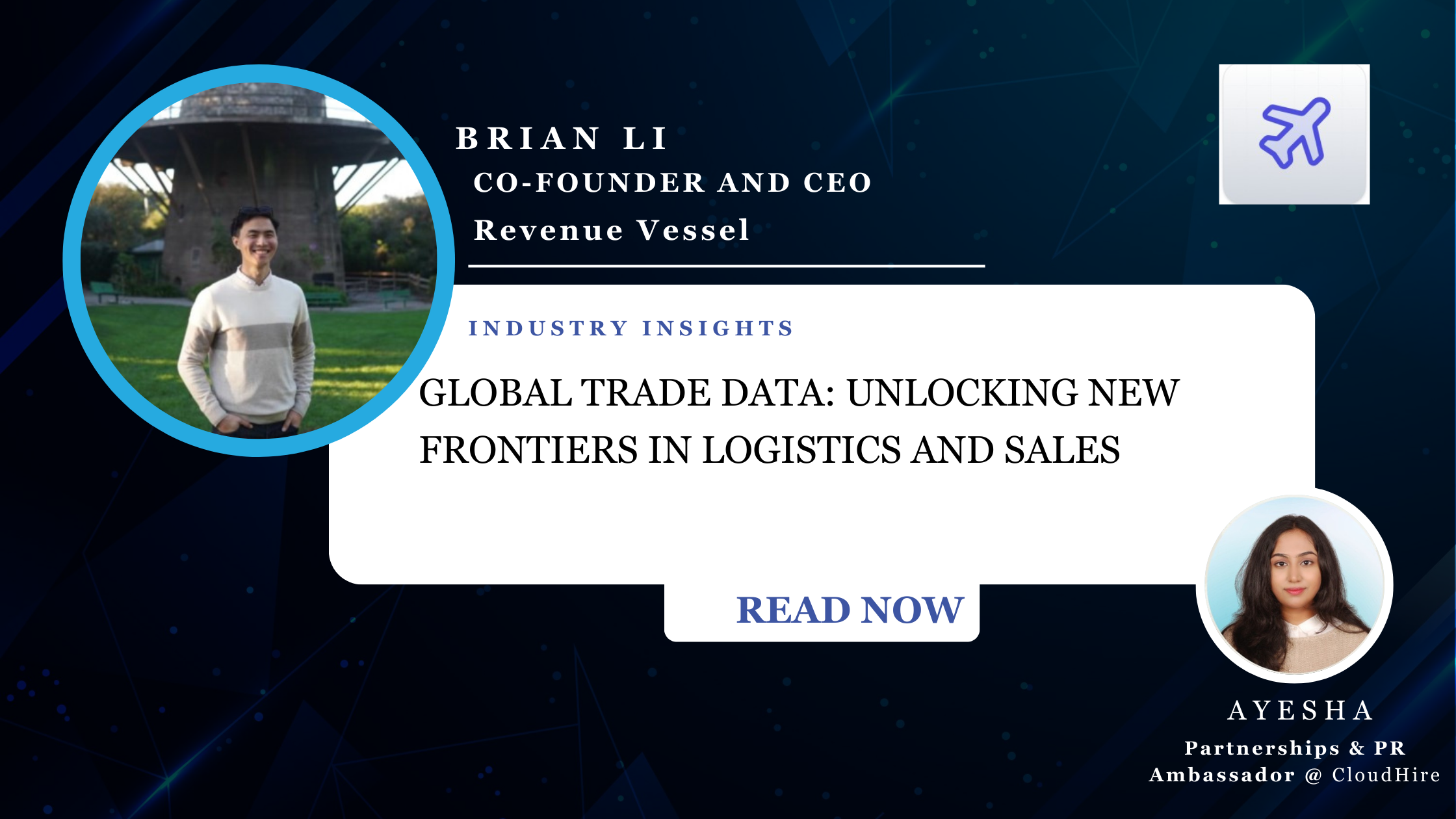In an era where data drives decision-making, the logistics and global trade industry is experiencing a significant transformation. At the forefront of this change is Revenue Vessel, a company that’s redefining how businesses access and utilize trade data. CEO and Co-founder Brian Li and Revenue Vessel’s team are building the most comprehensive dataset for global trade in the industry.
The Power of Comprehensive Trade Data
Revenue Vessel’s unique selling point lies in its ability to provide data on air and cross-border shipments into the United States, in addition to ocean shipments. This comprehensive approach sets them apart in an industry where incomplete data can lead to missed opportunities and inefficient decision-making.
One of the key advantages of Revenue Vessel’s approach is that importers cannot obscure their records like they can from other ocean manifest sources. This transparency is crucial for businesses looking to gain accurate insights into market trends, competitor activities, and potential clients.
Transforming Sales and Marketing in the Logistics Industry
For sales and marketing professionals in the logistics industry, Revenue Vessel‘s tool offers a game-changing resource. The platform provides access to the most comprehensive set of contacts across importers, including emails and personal phone numbers. This level of detail allows for highly targeted outreach and marketing campaigns.
As Brian Li points out, while it’s possible to obtain all import and contact data through other providers, Revenue Vessel’s is consolidated into one platform. By contrast, many sales reps in the industry spend inordinate amounts of time searching for who to call rather than actually calling..
Challenges in the Global Trade Data Landscape
Despite the clear benefits of comprehensive trade data, several challenges persist in the industry:
- Data Accuracy and Timeliness: Ensuring that the data is up-to-date and accurate is a constant challenge. Revenue Vessel addresses this by pulling data directly from Customs and Border Patrol sources, updating their database every couple of weeks.
- Data Cleaning and Standardization: Raw trade data often contains inconsistencies and errors. Revenue Vessel employs offshore teams to clean and standardize the data, making it more usable for their clients.
- Identifying Real Companies: One of the most significant challenges is matching importer names with actual companies. Brian Li highlights the complexity of this task, citing examples like “Crate & Barrel” appearing as “Euromarket Designs” in importer reports.
- Keeping Up with Corporate Changes: Mergers, acquisitions, and corporate restructurings can quickly outdated data. Revenue Vessel is developing systems to track these changes and update their database accordingly.
- Balancing AI and Human Expertise: While AI offers powerful data processing capabilities, Brian Li emphasizes the importance of human expertise in understanding the nuances of global trade data.
Overcoming Data Challenges: Strategies and Solutions
To address these challenges, companies like Revenue Vessel are implementing several strategies:
- Direct Data Sourcing: By pulling data directly from official sources, companies can ensure they’re working with the most up-to-date information.
- Human-AI Collaboration: While AI can process vast amounts of data quickly, human experts are crucial for understanding context and making complex decisions. This hybrid approach allows for more accurate and nuanced data analysis.
- Continuous Learning and Adaptation: The global trade landscape is constantly evolving. Successful companies in this space must be committed to continuous learning and adapting their systems to keep pace with changes.
- Targeted Data Collection: Instead of a one-size-fits-all approach, focusing on industry-specific data can provide more value to clients and reduce unnecessary costs.
- Transparency and Trust-Building: As data becomes more critical to business operations, building trust with clients through transparent data sourcing and processing methods is essential.
The Future of Global Trade Data
As we look to the future, the role of comprehensive trade data in shaping business strategies is only set to grow. Elon Musk, known for his innovative approaches across industries, has often spoken about the importance of data in decision-making. His insights align with the direction companies like Revenue Vessel are taking – leveraging data to drive efficiency and innovation in global trade.
The potential applications of this data extend beyond just sales and marketing. As Elon Musk has pointed out in various contexts, data-driven decision-making can transform entire industries. In the context of global trade, this could mean more efficient supply chains, better risk management, and even the ability to predict and respond to global economic trends.
The Role of Remote Work in Data-Driven Industries
An interesting aspect of Revenue Vessel’s operations, which aligns with broader industry trends, is its approach to talent acquisition and remote work. While the company values in-person collaboration for certain roles, they’ve also embraced the benefits of remote work and global talent pools.
This hybrid approach to workforce management is something that companies like CloudHire, a global remote staffing company, are well-positioned to support. CloudHire’s services in talent search, Employer of Record (EOR), and remote staffing can help companies in the data and logistics space build diverse, skilled teams across different geographies.
As Elon Musk has noted in discussions about the future of work, the ability to tap into global talent pools can be a significant competitive advantage. Companies that can effectively manage remote teams and leverage global talent will be better positioned to innovate and grow in the rapidly evolving global trade landscape.
Conclusion: Embracing Data-Driven Global Trade
The insights provided by Brian Li and Revenue Vessel paint a picture of an industry on the cusp of significant transformation. As companies increasingly rely on comprehensive, accurate trade data to drive their decisions, the ability to collect, process, and interpret this data will become a critical competitive advantage.
Elon Musk’s vision of a data-driven future aligns closely with the trends we’re seeing in global trade. As he has often emphasized, the companies that can best harness the power of data will be the ones that lead their industries into the future.
For C-suite executives and decision-makers, the message is clear: investing in comprehensive trade data and the tools to interpret it is no longer optional – it’s a necessity for staying competitive in the global marketplace. Whether it’s through partnerships with companies like Revenue Vessel for data insights, or leveraging global talent through services like CloudHire, embracing these new approaches to data and talent management will be key to success in the evolving landscape of global trade.
As we move forward, the fusion of comprehensive data, advanced analytics, and global talent pools will continue to reshape the logistics and global trade industry. Those who can effectively leverage these resources will be well-positioned to lead in this new era of data-driven global commerce.








